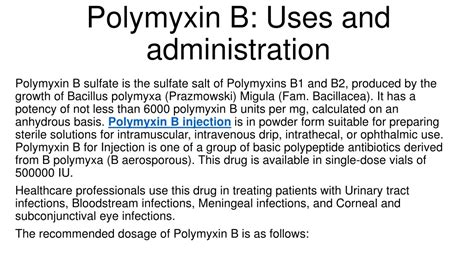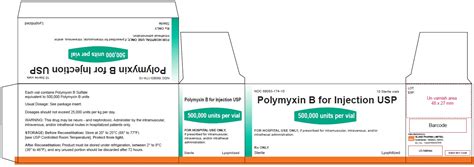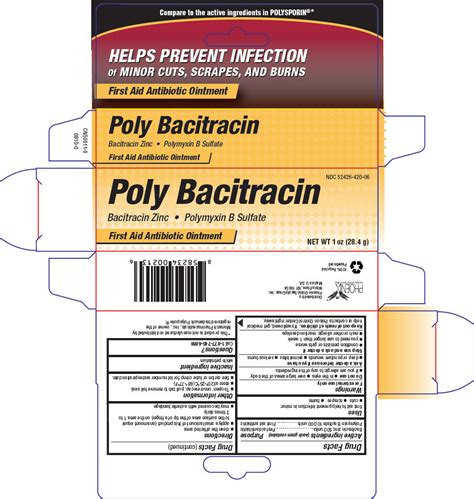Intro
Discover the uses and side effects of Polymyxin B Sulfate, a potent antibiotic used to treat severe bacterial infections. Learn about its mechanism of action, indications, and potential risks, including nephrotoxicity and neurotoxicity. Understand the benefits and drawbacks of this antibiotic and its role in modern medicine.
Polymyxin B sulfate is a type of antibiotic that has been used for decades to treat various bacterial infections. Despite its effectiveness, the medication can cause serious side effects, and its use is often reserved for specific situations. In this article, we will delve into the uses of polymyxin B sulfate, its mechanism of action, side effects, and the importance of using it judiciously.

Polymyxin B sulfate is a member of the polymyxin class of antibiotics, which are derived from the bacterium Paenibacillus polymyxa. The medication works by binding to the bacterial cell membrane, disrupting its structure and ultimately leading to the death of the bacterial cell. This mechanism of action makes polymyxin B sulfate effective against a wide range of Gram-negative bacteria, including Pseudomonas aeruginosa, Escherichia coli, and Klebsiella pneumoniae.
Uses of Polymyxin B Sulfate
Polymyxin B sulfate is used to treat various bacterial infections, including:
- Urinary tract infections (UTIs)
- Respiratory tract infections, such as pneumonia
- Skin and soft tissue infections
- Septicemia (bloodstream infections)
The medication is often used as a last resort, when other antibiotics have failed or are ineffective against the specific bacterial strain. This is due to the potential for serious side effects, which will be discussed later in this article.
Mechanism of Action
Polymyxin B sulfate works by binding to the bacterial cell membrane, specifically to the lipopolysaccharide (LPS) component. This binding causes a disruption in the membrane structure, leading to the leakage of essential nutrients and ions. The bacterial cell ultimately dies due to the loss of these essential components.

Side Effects of Polymyxin B Sulfate
While polymyxin B sulfate is effective against various bacterial infections, its use can be associated with serious side effects. Some of the most common side effects include:
- Nephrotoxicity (kidney damage)
- Neurotoxicity (nerve damage)
- Respiratory failure
- Cardiac arrest
These side effects are often dose-dependent and can be minimized by using the medication judiciously and monitoring patients closely.
Nephrotoxicity
Nephrotoxicity is one of the most significant side effects associated with polymyxin B sulfate. The medication can cause damage to the kidneys, leading to acute kidney injury (AKI) or chronic kidney disease (CKD). This side effect is often reversible, but it can be severe and require dialysis in some cases.

Precautions and Contraindications
Due to the potential for serious side effects, polymyxin B sulfate should be used with caution and only when necessary. The medication is contraindicated in patients with:
- Known hypersensitivity to polymyxin B sulfate
- Renal impairment or kidney disease
- Neuromuscular disorders, such as myasthenia gravis
Patients with these conditions should be carefully evaluated before receiving polymyxin B sulfate, and alternative treatments should be considered whenever possible.
Pregnancy and Breastfeeding
Polymyxin B sulfate is classified as a category B medication, meaning that it is not expected to cause harm to the fetus or baby. However, the medication should be used with caution during pregnancy and breastfeeding, as there is limited data available on its safety in these populations.

Conclusion
Polymyxin B sulfate is a powerful antibiotic that is effective against various bacterial infections. However, its use can be associated with serious side effects, including nephrotoxicity and neurotoxicity. The medication should be used judiciously and only when necessary, and patients should be carefully monitored for potential side effects. By understanding the uses, mechanism of action, and side effects of polymyxin B sulfate, healthcare providers can make informed decisions about its use and provide optimal care for their patients.
Invite your readers to comment, share the article, or take specific actions:
If you have any questions or concerns about polymyxin B sulfate, please leave a comment below. Share this article with your colleagues or friends who may be interested in learning more about this antibiotic. For more information on antibiotics and their uses, stay tuned for our upcoming articles.
What is polymyxin B sulfate used for?
+Polymyxin B sulfate is used to treat various bacterial infections, including urinary tract infections, respiratory tract infections, skin and soft tissue infections, and septicemia.
What are the common side effects of polymyxin B sulfate?
+The common side effects of polymyxin B sulfate include nephrotoxicity, neurotoxicity, respiratory failure, and cardiac arrest.
Can polymyxin B sulfate be used during pregnancy and breastfeeding?
+Polymyxin B sulfate is classified as a category B medication, meaning that it is not expected to cause harm to the fetus or baby. However, the medication should be used with caution during pregnancy and breastfeeding, as there is limited data available on its safety in these populations.
